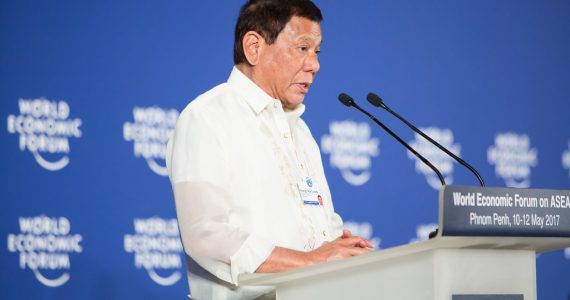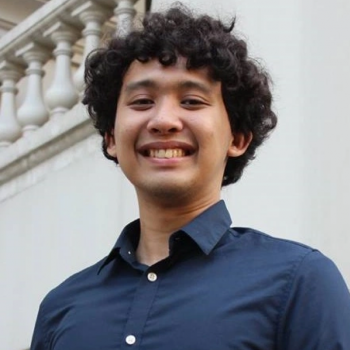
Of defense agreements and a void US visa: Duterte’s reactive ‘Philippine independent foreign policy’
Disclaimer: The views and opinions expressed in this article are those of the author and do not necessarily reflect the opinion of CISS or its members.
On September 10, 2016, barely two months in his seat as chief executive, Philippine president Rodrigo Duterte declared that his administration is pursuing an ‘independent foreign policy’ following his meeting at the Association of Southeast Asian Nations (ASEAN) Summit in Laos (Francisco 2016). He emphasized this as a practice of the regional intergovernmental organization’s doctrine on non-interference and sovereign equality. A month later, he announced the Philippines’ ‘separation’ from the United States to forge stronger relations with China and Russia (Morales 2016, Reuters 2016). The former mayor of the sprawling urban city of Davao is known to have a controversial rhetoric, similar to that of fellow populist demagogues such as Donald Trump, Boris Johnson, and Jair Bolsonaro. As usual, Duterte’s ministers reinterpreted his statement as lessening the country’s dependence from its former colonizer. The Philippine foreign ministry defended this venture as a strategic move that would benefit the country’s economic environment (Credo 2017).
There is, however, no definite document that clearly outlines what Duterte means by having an ‘independent foreign policy.’ Numerous traditional security scholars have only interpreted the words that came directly from his out-of-script public speeches with regards to the country’s foreign relations. This is incongruous as the president is considered to be the primary architect of the Philippine foreign policy.
An exhibition of Duterte’s reactive tirades that the Philippine foreign ministry considers to be a foreign policy is his denial of the aid coming from the European Union (EU) (Viray 2018). Presumably, this is due to the latter’s criticism of Duterte’s drug war that killed 27,000 individuals, mostly coming from impoverished backgrounds (Human Rights Watch 2019). The denial was confirmed by EU ambassador to the Philippines, Franz Jessen (Esmaquel 2018). Aside from the EU, the country also expressed its denial to accept aid and donations from Argentina, Australia, Bahamas, Fiji, Iceland, Mexico, Peru, Ukraine, and Uruguay as they voted for the investigation of the Philippines’ human rights situation in the United Nations Human Rights Council (UNHRC) (De Vera 2019).
Duterte made another reactive threat in January 2020, this time against the United States, to end the Visiting Forces Agreement (VFA) (Aguilar 2020). This followed the confirmation that Philippine senator Ronald dela Rosa’s US visa was voided by the US Magnitsky Act. Dela Rosa was Duterte’s police chief and the first implementor of the administration’s war on drugs. Moreover, both politicians linked opposition senator Leila de Lima to drug operations and put her in jail for the alleged misconduct. The president said once again that voiding Dela Rosa’s US visa for his involvement in the drug war was abridging Philippine sovereignty (Santos 2020). The VFA is a defense agreement between the Philippines and the United States to conduct military operations that would be mutually beneficial for both countries’ national security interests. In addition, this allows US military to conduct trainings and counterterrorism operations in the country and in cooperation with the Armed Forces of the Philippines.
Militant activists that have long been against US military operations in the Philippines are skeptical about the recent rants of Duterte with the American government. Bagong Alyansang Makabayan’s (New Patriotic Alliance’s) secretary-general, Renato Reyes Jr, said that “the cancellation of the VFA should not be based on [Dela Rosa’s] void US visa. The cancellation of the VFA should have been done a long time ago as it is not equally beneficial [to the Philippines]. If the visa will be returned, then what kind of policy is this?” (Reyes 2020).
As a matter of fact, the threat became reality. The Philippine government forwarded its notice of the termination of the VFA to the United States Embassy in Manila on February 11, 2020 (Tomacruz 2020). This gives the United States government 180 days to continue their operations in the Philippines and withdraw their troops within the specified period.
Now, the question arises as to where the decisions about the Philippine foreign policy and sovereignty are really made and will be made in the future. Are they in the hands of Duterte’s new-built oligarchy? In any case, the country can expect nothing but more reactive actions.
References
Aguilar, Krissy. 2020. Duterte orders start of VFA termination process—Palace. Philippine Daily Inquirer. https://globalnation.inquirer.net/184485/duterte-orders-start-of-vfa-termination-process-palace. Accessed: 27 January 2020.
Credo, Jeremie. 2017. Understanding the Strategic Importance of Duterte’s Foreign Trips. CIRSS Commentaries. http://www.fsi.gov.ph/understanding-the-strategic-importance-of-dutertes-foreign-trips/. Accessed: 27 January 2020.
De Vera, Ben. 2019. Duterte order shuns all loans, grants, aid from 18 countries backing probe of PH killings. Philippine Daily Inquirer. https://business.inquirer.net/279344/duterte-order-shuns-all-loans-grants-aid-from-18-countries-in-favor-of-probe-of-ph-killings. Accessed: 27 January 2020.
Esmaquel, Paterno II. 2018. Philippines formally rejects P380 million in EU aid. Rappler. https://www.rappler.com/nation/194426-philippines-formally-rejects-european-union-aid. Accessed 27 January 2020.
Francisco, Katerina. 2016. Duterte: PH to pursue independent foreign policy. Rappler. https://www.rappler.com/nation/145759-duterte-philippines-independent-foreign-policy. Accessed: 27 January 2020.
Human Rights Watch. 2019. Philippines: ‘Drug War’ Devastates Children’s Lives: Kids Suffer in President Duterte’s Brutal Campaign. https://www.hrw.org/news/2019/06/27/philippines-drug-war-devastates-childrens-lives. Accessed: 27 January 2020.
Morales, Neil Jerome. 2016. Philippines’ Duterte says didn’t really mean ‘separation’ from U.S. Reuters. https://www.reuters.com/article/us-china-philippines/philippines-duterte-says-didnt-really-mean-separation-from-u-s-idUSKCN12L28T. Accessed: 27 January 2020.
Reyes, Renato Jr. 2020. Simplehan na lang po natin. Ang pagbasura sa VFA ay di dapat nakasalalay sa kung bibigyan ba o hindi ng US […]. Twitter. https://twitter.com/natoreyes/status/1220504184899788800. Accessed: 27 January 2020.
Reuters. 2016. Philippines’ Duterte says China, Russia supportive when he complained of U.S. https://www.reuters.com/article/us-philippines-duterte-usa/philippines-duterte-says-china-russia-supportive-when-he-complained-of-u-s-idUSKCN1220O4. Accessed: 27 January 2020.
Santos, Eimor. 2020. Duterte: China, Russia – unlike US – respect PH sovereignty. CNN Philippines. https://cnnphilippines.com/news/2020/1/24/duterte-russia-china-united-states.html. Accessed: 27 January 2020.
Tomacruz, Sofia. 2020. Philippines sends VFA notice of termination to U.S. Rappler. https://www.rappler.com/nation/251508-philippines-terminates-visiting-forces-agreement-united-states. Accessed: 3 March 2020.
Viray, Patricia Lourdes. 2018. EU envoy confirms Philippines’ rejection of P382-M aid. Philippine Star. https://www.philstar.com/headlines/2018/01/25/1781277/eu-envoy-confirms-philippines-rejection-p382-m-aid. Accessed: 27 January 2020.

Jeconiah Louis Dreisbach
Jeconiah Louis Dreisbach holds an MA in Philippine Studies from De La Salle University (Philippines). He took graduate-level courses in international relations at the Center for Global Politics – Free University of Berlin. He is a Fellow of the Royal Asiatic Society of Great Britain and Ireland. As a researcher and educator, his writings about Philippine international relations have been published in the Kyoto Review of Southeast Asia, the Malaysian Journal of International Relations, and Asian Politics & Policy.
